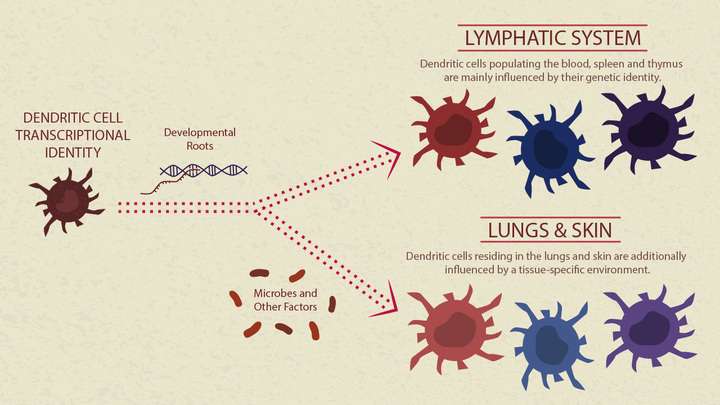Guards of the human immune system unraveled

Dendritic cells represent an important component of the immune system: they recognize and engulf invaders, which subsequently triggers a pathogen-specific immune response. Scientists of the University Hospital Erlangen of the Friedrich-Alexander-University Erlangen-Nürnberg (FAU) and the LIMES (Life and Medical Sciences) Institute of the University of Bonn gained substantial knowledge of human dendritic cells, which might contribute to the development of immune therapies in the future. The results were recently published in the journal Science Immunology.
Dendritic cells - their name is derived from the large amount of dendrites on their cell surface - populate most parts of the human body. There they act as guards by recognizing, engulfing, and processing foreign pathogens. Finally, those dendritic cells migrate to nearby lymph nodes, where they interact with other immune cells to trigger a pathogen-specific immune response. Consequently, dendritic cells play an important role within the complex immune system. In recent years, it became evident that in the mouse dendritic cells are composed of different subtypes, which differ in function and distribution across the body. In contrast, less was known about the corresponding situation in humans.
Recently, Dr. Gordon Heidkamp and Prof. Dr. Diana Dudziak from the University Hospital Erlangen performed a global study, which, for the first time, systematically characterized dendritic cells in different human organs such as blood, spleen, thymus, tonsils, bone marrow, cord blood. Using 16-color flow cytometry, they detected different dendritic cell subtypes, determined their distribution across the various organs and identified important cell surface proteins. As a result, the scientists revealed that the surface profiles of dendritic cells of the same subtype are constant throughout the different tissues.
Additionally, the scientists from Erlangen isolated dendritic cells from human blood, spleen, and thymus and analyzed their genetic information in the form of ribonucleic acid (RNA). The complex data analysis was performed in close collaboration with Jil Sander and Prof. Dr. Joachim L. Schultze from the LIMES Institute of the University of Bonn. Using innovative methods, for example Cibersort analysis, they were able to imposingly demonstrate that the different subtypes share a constant profile, regardless of their initial location. Prof. Dr. Schultze: "In contrast, our data further demonstrate that within non-lymphatic organs such as lungs and skin, tissue-specific signals have a higher impact on the transcriptional output of dendritic cells."
According to these recently published findings and due to the special characteristics of dendritic cells, the scientists expect substantial impacts on the therapy of immune diseases as well as on the development of new approaches to treat tumors. Prof. Dudziak summarizes: "There is evidence that dendritic cells might play a crucial role for the development of innovative therapies targeting the immune system. Our results help to understand the fundamental characteristics of dendritic cells."
The study was conducted in a close collaboration between Dr. Gordon Heidkamp and Prof. Dr. Diana Dudziak from the University Hospital Erlangen and Jil Sander and Prof. Dr. Joachim L. Schultze from the LIMES Institute of the University of Bonn. The latter are members of the excellence cluster ImmunoSensation. In total, 31 scientists were involved in this project, located in Erlangen, Bonn, Kiel, Bamberg, Augsburg, Frankfurt, and Singapore.
More information: "Human lymphoid organ dendritic cell identity is predominantly dictated by ontogeny, not tissue microenvironment," Science Immunology, immunology.sciencemag.org/look … 6/sciimmunol.aai7677

















